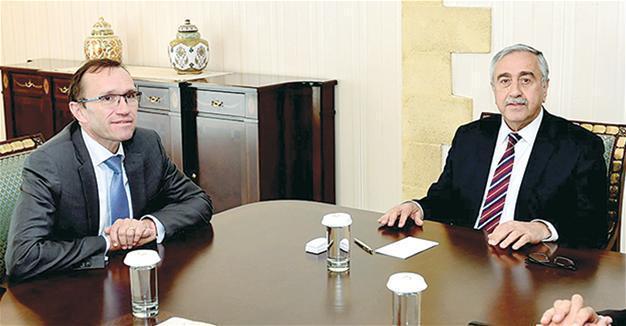UN envoy says Cyprus security deal possible
NICOSIA

The United Nations has helped put together a compromise formula that could overcome the key obstacle of security which stands in the way of a deal to reunify the eastern Mediterranean island of Cyprus, a U.N. envoy said on April 13.
Espen Barth Eide, the U.N. special envoy on Cyprus, declined to give details, but said the formula was the result of consultations with the two Cypriot leaders, the European Union and the island’s “guarantors” - Greece, Turkey and Britain.
“An idea is emerging that I am quite confident could work,” Eide told The Associated Press. He said the formula is based on what all sides “actually need” rather than what’s currently in place.
Security has long stumped talks to end the conflict.
Turkey intervened in the northern third of the island in 1974 following a coup by supporters of union with Greece. Due to the security concerns of Turkish Cypriots, Turkey keeps more than 30,000 troops in Turkish Cyprus.
Turkey says it wants to keep troops on the east Mediterranean island and maintain the right to intervene militarily as part of any reunification deal, reminding the tragic events in the 1960s and 1970s that led to Turkey’s intervention. Turkish Cypriots insist Turkey’s military presence would be instrumental to their security. But Greek Cypriots see it as a threat and an instrument of Ankara’s influence on the island.
“I think a mutual agreement on security and guarantees is possible,” Eide said, though he added that he’s worried if there was enough trust and will on both sides to achieve a peace accord - a rare display of concern about the talks after nearly two years of solid progress.
Eide urged Nicos Anastasiades, the Greek Cypriot president, and Turkish Cypriot leader Mustafa Akıncı to show “true leadership” before domestic and regional developments over the next several months make talks more difficult.
“We can walk this path with Cyprus, but we cannot do it for you ... If the Cypriots don’t want it, we don’t want it,” he said.
Negotiations resumed on April 11 following a two-month halt due to the Greek Cypriot Parliament’s decision to mark a 1950 referendum seeking union with Greece at schools.
On April 7, the Greek Cypriot Parliament undid this decision, which allowed for the peace process to restart.
Eide also told Reuters in an interview that Greek and Turkish Cypriots have reached a critical juncture in negotiations to end the decades-old division and only a small number of issues remain to be resolved.
“We are at a crossroads,” Eide told Reuters.
“I think the leaders know that we are at the crossroads and at the crossroads you have to take the right turn, or the alternative is the wrong turn,” he added.
 The United Nations has helped put together a compromise formula that could overcome the key obstacle of security which stands in the way of a deal to reunify the eastern Mediterranean island of Cyprus, a U.N. envoy said on April 13.
The United Nations has helped put together a compromise formula that could overcome the key obstacle of security which stands in the way of a deal to reunify the eastern Mediterranean island of Cyprus, a U.N. envoy said on April 13.